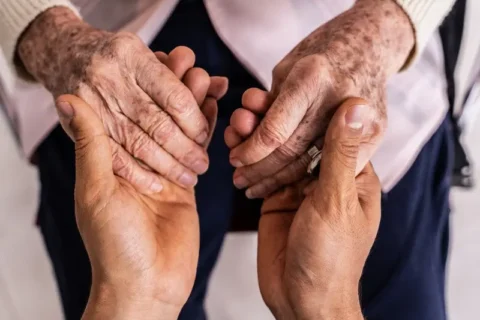Long Term Palliative Care and Hospice: Working Together
What is the relationship between long term care and hospice? In the best case scenario, these two types of care fit together seamlessly, making patients’ lives better. It is estimated that 24 percent of older adults are receiving long term care at the end of their lives. This could be in a nursing home or assisted living community, or long term home health care in the patient’s long term home, and hospice care can be provided in the same location. Hospice care is difficult to talk about, though, because no one really wants to think about end of life, whether for themselves or for a loved one. If we look at hospice as the next step in quality care, seeking to improve the transition from long term care and hospice, we may be able to help people see it a little bit differently.
When someone is dealing with a terminal illness or a chronic condition that is progressing, it is very likely that hospice will need to come into play at some point. Viewing it as the next step up from long term care, in a continuum of care, makes sense in many ways. There are some similarities in these two types of care. For example, like long term care, hospice uses a team approach, with many of the same types of caregivers, like massage therapists and social workers. The goal of both types of care is to address the current needs of patients and family in a way that is compassionate.

Looking at long term care and hospice as part of the same whole can be helpful to patients, especially if they don’t need hospice care in the short term, but would benefit from having information about services that may need to be utilized in the future. A focus on having similar employees and types of care in both long-term care and hospice can provide a feeling of closeness as mentioned above. Having social workers that collaborate to a greater degree in the transition from one type of care to the other can also be beneficial. It is also advantageous for patients to have continuous, cohesive care, without needing to relocate towards the end of life.
For thoughtful, compassionate end of life care, contact Agape Hospice & Palliative Care. At Agape, our name reflects our philosophy. Agape is a Greek word meaning love, and this is what we offer to our patients and families, improving their quality of life so that patients can live the remainder of their lives to the fullest. We see our patients as a gift, and we are grateful for all they have achieved throughout their lives. That’s why we show that gratitude through compassionate skilled medical care, addressing not just the physical needs of our patients, but also their psychological, emotional, and spiritual needs as well. We are accredited by The Joint Commission, nationally recognized as the gold standard in health care, and we have met the organization’s enhanced requirements for patient safety and quality of care. Agape’s interdisciplinary team is made up of a number of accredited medical professionals, all working together to care for our patients and their families. We offer free nursing services, therapy pet visits, home health aides, pain control, physical therapy, speech therapy, and social services, as well as inpatient care, respite care for caregivers, bereavement support, and volunteer assistance. We want our patients and their families to know that they are not alone in this transition. If you would like more information about our services, call us at 213-234-5535 or contact us through our website.


